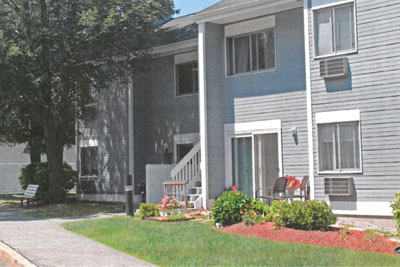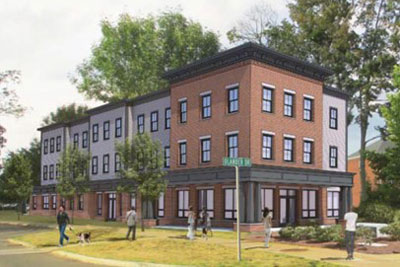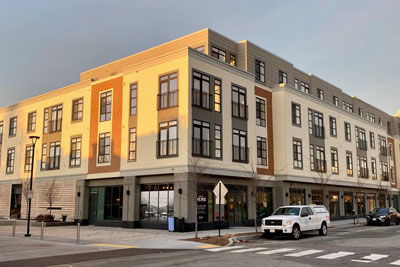BOSTON – May 14, 2020 – MassHousing has awarded $700,000 in grant funding to bring COVID-19 relief to 31 non-profit providers of affordable sober housing to help ensure their financial stability and continued support services for more than 660 men, women, and women with children working to overcome addiction in 17 communities across the Commonwealth.
The grants, which were up to $25,000 to non-profit affordable sober housing providers who had previously received financing from MassHousing, came from the Center for Community Recovery Innovations, Inc. (CCRI), a subsidiary corporation of MassHousing with a mission to increase, improve and support affordable sober housing for individuals and households in recovery in Massachusetts. The grants were considered and allocated on a case-by-case basis.
"The COVID-19 crisis has particularly impacted the lives of some of our most vulnerable citizens and the economic stability of the many non-profit organizations that provide vital sober housing and support services to people fighting addiction around the Commonwealth," said MassHousing Executive Director Chrystal Kornegay. "Many residents have lost their jobs and cannot pay rent, and many non-profit organizations are struggling to meet their financial obligations due to reduced rental income and increased operating costs connected to the pandemic."
The non-profit sober housing providers have seen increased costs for food, supplies and cleaning. There have been added payroll expenses for overtime or additional staff to maintain the sober housing and services, as well as assisting residents in applying for available state and federal COVID-19-related benefits. Some entities have also identified additional costs for technology to allow residents to utilize telehealth options and participate remotely in their regular recovery programs.
The availability of these CCRI grants will serve as bridge funding to keep sober homes operational and prevent residents from being displaced.
One such entity that received CCRI COVID-19 assistance is the non-profit EMH Recovery in Brockton, which operates the 21-unit Edwina Martin House for women with addictions, and two sober homes for the graduates of Edwina Martin House – Blake House and Paul McDevitt House, which both received prior CCRI funding. MassHousing has provided EMH Recovery with $50,000 to be split between the two sober homes.
Most of the nearly 40 women in recovery living at Blake House and Paul McDevitt House have lost their jobs and are likely not eligible for unemployment or federal COVID-19 benefits. They are unable to pay their rent – which is a major financing source for the sober homes – and EMH Recovery is helping them meet the costs for food, medical care and technology so that they can remain in contact with family, counselors and sponsors, medical providers and other services critical to their ongoing recovery.
"These women have made great progress and are just starting to get traction on where we all want them to get to in completing their recovery," said EMH Recovery Executive Director Judith McDonough. "We’re still going to provide the services they need. They have no money for rent or food, but we are going to cover that for them."
McDonough said her organization’s annual spring fundraising event, which provides a substantial part of the EMH Recovery’s operating budget each year, has been cancelled because of the COVID-19 crisis. The MassHousing CCRI grants, she said, will help ensure that the women overcoming addiction will be able to continue to live and thrive at the two sober homes.
"We have to quarantine them and wait out the COVID-19 storm, but we are surprised at how well they are handling it and how resilient they are," she said. "We know their recovery is working. We see it. We’re working to keep their anxiety down and provide them the services they need to succeed."
The 31 CCRI grants involved 37 sober homes and 660 residents in 17 communities. In addition to EMH Recovery, other non-profit organizations that received grants were:
GAAMHA, Inc. in Gardner; Gilly’s House in Wrentham; Dismas House in Worcester and Oakham; Opening Heaven’s Door Ministry in Worcester; Housing Support, Inc. in Amesbury; Victory Programs, Inc. in Boston; Hope House in Boston; Steppingstone Incorporated in Fall River and New Bedford; Vineyard House in Vineyard Haven; Link House in Newburyport; Veterans Inc. in Worcester and Shrewsbury; St. Mary’s Center for Women and Children in Dorchester; Jeremiah’s Inn in Worcester; The Megan House Foundation in Dracut; Abby’s House in Worcester; Bridgewell in Lynn; Lowell House, Inc. in Lowell; Father Bill’s and Mainspring in Brockton; Brookview House in Boston; Sage Housing, Inc. in Greenfield; Greater New Life Christian Center in Springfield; and Latin American Health Alliance in Worcester.
About CCRI
The Center for Community Recovery Innovations, Inc., issues an annual Request for Proposals (RFP) to solicit projects for funding. The proposals that are selected need to meet CCRI's current priorities and eligibility categories. The grants are typically used as one-time gap funding for capital projects that increase or improve the stock of affordable sober housing in Massachusetts. Other proposals that provide services for residents in MassHousing-financed rental housing, specifically those that address alcohol and/or drug abuse or addiction, are also considered for funding. CCRI grant recipients must be 501c3 non-profit organizations and traditionally matching funds must be provided. All proposals and applicant qualifications are stringently reviewed and vetted by MassHousing.
To date, CCRI has awarded more than $11 million in grants for the creation or preservation of nearly 2,400 units of substance-free housing, in 53 communities, serving recovery populations that include men, women, families, veterans, the homeless and ex-offenders.
About MassHousing
MassHousing (The Massachusetts Housing Finance Agency) is an independent, quasi-public agency created in 1966 and charged with providing financing for affordable housing in Massachusetts. The Agency raises capital by selling bonds and lends the proceeds to low- and moderate-income homebuyers and homeowners, and to developers who build or preserve affordable and/or mixed-income rental housing. MassHousing does not use taxpayer dollars to sustain its operations, although it administers some publicly funded programs on behalf of the Commonwealth. Since its inception, MassHousing has provided more than $24.3 billion for affordable housing. For more information, follow us on Twitter, Facebook and LinkedIn.
###


